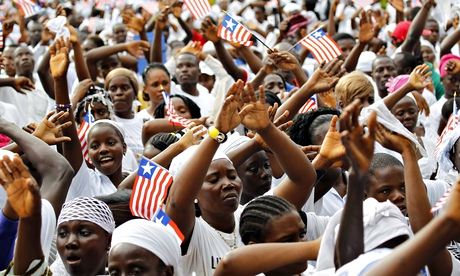
A journalist in Sierra Leone who has criticised the government’s handling of the Ebola outbreak was allegedly beaten then jailed under emergency laws meant to help bring the epidemic under control.
David Tam Baryoh, a high-profile radio journalist whose reports have often needled officials, is being detained at the maximum-security Pademba Road prison in the capital Freetown. His popular weekly programme, Monologue, was taken off air mid-show last week as he interviewed an opposition party spokesman who criticised the president’s alleged intentions to run for a third term. During that show Baryoh also questioned arrests made in Kono, an eastern district put under curfew in October when a dispute between youths and police over a suspected case of Ebola degenerated into gunfire and rioting.
Guinea, Sierra Leone and Liberia between them now account for nearly 5,000 Ebola deaths, and have all declared states of emergency as cases continue to climb. But months into the outbreak, the growing epidemic has swept in a belated influx of international aid as well as political and social tensions as governments’ popularity ratings take a battering.
Legislators in Sierra Leone threatened to gag the media over their coverage of the controversial allocation in September of 60m leones (£8,620) to each MP to boost Ebola awareness in their constituencies. In Liberia, the hardest-hit country, police last month used batons and whips to disperse protesters as lawmakers debated a request to extend president Ellen Johnson Sirleaf’s powers beyond the already sweeping ones accorded by the state of emergency declared in August.
Sierra Leone’s state of emergency empowers president Ernest Bai Koroma to arrest any person without a court order. An executive order to arrest Baryoh was signed by the president, chief superintendent Ibrahim Koroma told Reuters. “The powers were derived from the Ebola emergency regulations the country is currently under,” he said, without detailing the charges against the journalist or specifying the length of his detention.
Local journalists said they fear a crackdown as they seek to keep on top of hundreds of millions of aid coming in. Residents, journalists and an official told the Guardian that trucks carrying food aid were sometimes parked outside quarantine cordons, which intended recipients couldn’t cross. The food was then looted by those meant to be distributing it. Burial teams have repeatedly gone on strike over unpaid hazard allowances.
“People are feeling enraged because you can imagine you’ve lost two or three members of your family, and then someone comes knocking on your door with a bar of soap. That’s the only aid really filtering down to a lot of people,” a security adviser said.
Almost a third of the amount pledged by the European Union will come from Britain’s £205m aid package. Much of that has been channelled through established NGOs, or is handled directly by Britain, such as a UK-funded medical facility that opened its doors on Wednesday after British troops worked round-the-clock to construct it in eight weeks.
But some inevitably disappears into government coffers in a nation that ranks 119 out of 177 on global corruption indexes, while hundreds of thousands of pounds have also come from wealthy local donors, government supporters or multinationals. Last year, a number of top health officials were indicted for siphoning about $500,000 from a childhood immunisation fund sponsored by the Gates Foundation.
“It’s a very tough time for journalists. A lot of money is moving around the country and we as journalists have to do our jobs and make sure it is being properly allocated,” said an local investigative reporter speaking on condition of anonymity.
An associate said Baryoh was beaten some time between police storming his office on Sunday and his being examined by a prison doctor on Monday. A source who visited Baryoh in prison said he was unable to stand properly, and clutched at his knees before tottering to the ground. Baryoh suffers from high blood pressure, and is struggling with the crowded conditions of a jail that houses about four times its capacity of 324 inmates, the source added.
“When the police arrested him in his office, there were six armed ones and a couple of plain clothes. They were really rough with him and threw away his blood pressure tablets,” a close friend of Baryoh’s told the Guardian. “A doctor has said he really needs to be in a hospital but officials made some excuse about no visitors because of Ebola, and shooed [the doctor] away.” Officials declined to comment on the allegations.
Peter Nkanga, West Africa representative of the Committee to Protect Journalists, said: “Sierra Leone’s genuine state of emergency means that critical thinking and public debate are more important than ever. Locking away journalists without charge helps nobody.”
Other reporters have been imprisoned in the notorious Pademba facility recently. Jonathan Leigh and Bai Bai Sesay were held for four months after publishing an article which criticised the president. All but one of the 26 charges against them were dropped upon their release in January.
